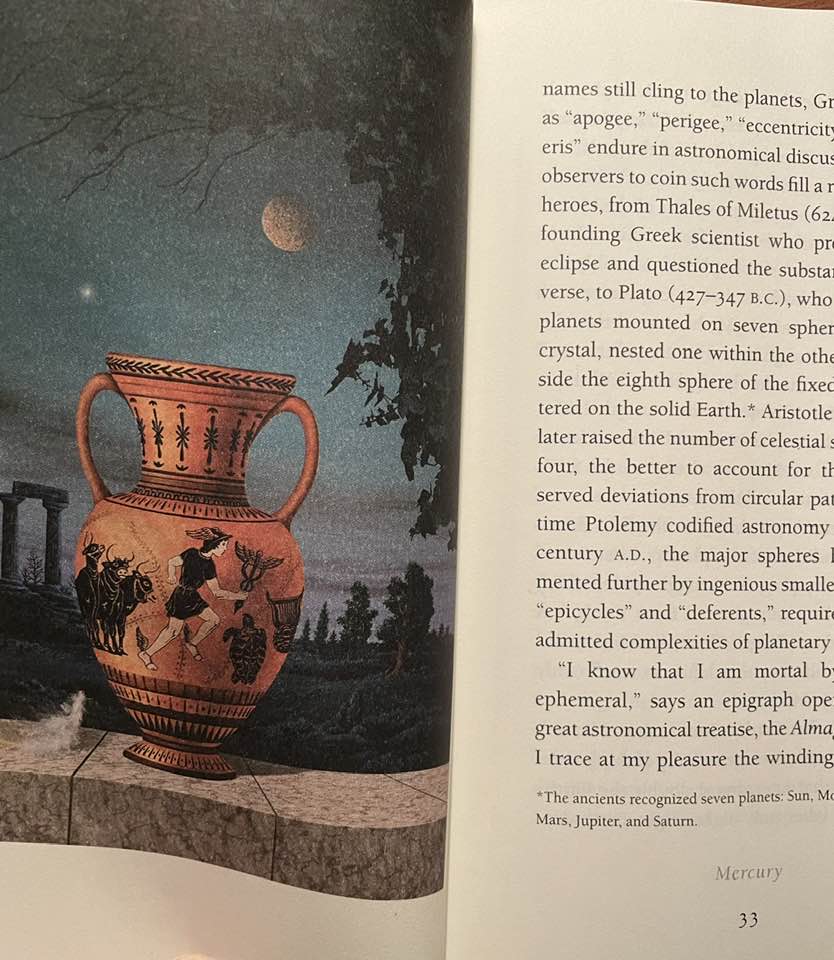MAY 5, 2024 – Recently I tried to imagine the experience of a 10- to 15-minute stroll on the surface of Mercury, our solar system’s inner-most planet. My “what if” thought was inspired by what Dava Sobel has so to say about it in her acclaimed book, The Planets. The key features of the speedy orb, named after the winged god of Ancient Greece (Hermes) and Rome (Mercury), are its: (a) small size relative to the rest of the planets (it’s only slightly larger than our moon); (b) speedy trip around Helios (88 earth days; about 1- ½ of its own long days – ironically, Mercury’s rotation isn’t so swift); and (c) its extreme surface temperatures—+801°F daytime; -279°F nighttime.
During my imaginary walk I pictured the scenery around me—the fractured rock, baked by day, frozen by night; the absence of color other than gray-blue; the absolute absence of sound; a blacker than black sky overhead, yet studded with a gazillion points of light; Ol‘ Sol appearing three times bigger and seven times brighter than he does from earth.
In many ways, the conditions and scenery would be much as they are on earth’s moon—our moon. People have walked on the moon, and none has suffered emotional or psychological scars, and understandably so. For starters, the earth as mother ship is never far away from the moon—only three days away. From the moon our home would appear four times larger than the full moon does from earth—a familiar blue and green disk encircled with pieces of fleece. Second, for countless generations, humankind has had a full and monthly look at the surface of the Moon. It’s an old familiar face; Mercury, far less so. Thanks to remote imagery, we know something about the lined and pockmarked surface of the innermost planet, but no human among the 117 billion thus far has ever laid an unaided eye on Mercury.
I’m certain that to find myself on Mercury would be most unsettling. Without earth and moon as reference points but with the sun so monstrously close, I’d soon grow terribly homesick for . . . home; home with its infinite varieties of life—and all the countless variations of the varieties. I’d pine for the lakes, rivers, and oceans; for the continents and their prairies, mountains, savannahs, and woodlands; for trees in all their majesty and hidden among the boughs and branches, the endless chorus of birdsong. None of this could be found on Mercury.
Worse, Earth, our beautiful planet, would be no more than an anonymous light among the billions of other luminous pinpricks; not the lush sphere with oceans blue and continents green (or largely so) and wisp-filled atmosphere hovering above the surface, giving sustenance to the only life forms known to us and our astronomic technology. Lost from our comforting view would be the moon, earth’s constant companion, whose clockwork phases and familiar light have enhanced and edified human life since the dawn of civilization. The sun, meanwhile, whose smiling face has graced the art of children for centuries, would instead be a monstrosity, projecting hellish heat from a roaring furnace.
I should think, however, that I’d be even more disturbed if I were an ardent believer, the purest religionist. I’d find myself beset with the question: if God existed on earth, does God perhaps not exist anywhere near this hellish, lifeless place we called Mercury? And where might heaven now be in the total absence of clouds and 71 million miles from God’s children . . . except me on Mercury?
Enough of the excursion on a lifeless planet. In the shortest order I wanted to rush back to earth. With the blink of an eye I did so. My spacesuit turned into . . . the clothes I’d been wearing all along. The sun was restored to its proper size, and I basked in the “Goldilocks” light and warmth of a 70°F cloudless day. I delighted in the backyard beauty of fresh flowers and in conspiracy with the sun, budding lilacs bushes spilling fanciful shadows into the alleyway; in a neighbor’s cheerful greeting and garden talk; and in another neighbor’s full tree, shaped like a hot air balloon poised for liftoff covered with a magnificent thicket of fragrant blossoms.
Best of all, however, was our eight-year-old granddaughter’s arrival with her dad. From the car she dashed across the lawn and met me with a running hug and a homemade greeting card in one outstretched hand. I hugged her in return and told her how much I’d missed her—from just the day before. We laughed in the carefree spirit of the day. She handed me the card, which bore a large, decorative “HELLO” on the outside and on the inside, a drawing of a multi-scoop ice cream cone above the message, “Thank you Grandpa for making enough for me and [by name, her nine-month-old cousin].” In the moment, those words melted my heart. The ice cream card will delight my soul forever. Not in billions of years—not ever—I thought, would such joy occur on Mercury, or anywhere else in the grand cosmos.
Yet later I read the news of the day—that is, the usual of late: human strife and friction; human loss and hardship, and it troubled me deeply. I’d “left” Mercury and its hostile features in favor of the lush and infinite beauty on earth; for the delights to be seen, heard, and felt only on earth but then to realize what angst and ugliness we’ve created within this oasis of the universe.
We must never forget that our home is home, and here on the fertile and receptive ground of earth is where we must sow, weed, and reap the best we can, cultivating our laudable traits, and above all, encouraging the running hugs and homemade greeting cards.
Subscribe to this blog and receive notifications of new posts by email.
© 2024 by Eric Nilsson
